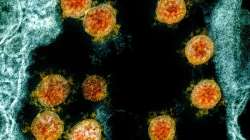US, Britain seek new WHO look into COVID origins in China
Late Thursday, the US diplomatic mission in Geneva issued a statement saying the first phase of the study was “insufficient and inconclusive,” and called for a “timely, transparent, evidence-based and expert-led Phase 2 study, including in the People's Republic of China”.

The United States and Britain are stepping up calls for the World Health Organisation to take a deeper look into the possible origins of COVID-19, including a new visit to China where the first human infections were detected. WHO and Chinese experts issued a first report in March that laid out four hypotheses about how the pandemic emerged.
The joint team said the most likely scenario was that the coronavirus jumped into people from bats via an intermediary animal, and the prospect that it erupted from a laboratory was deemed “extremely unlikely”. Late Thursday, the US diplomatic mission in Geneva issued a statement saying the first phase of the study was “insufficient and inconclusive,” and called for a “timely, transparent, evidence-based and expert-led Phase 2 study, including in the People's Republic of China”.
The statement — coming in the middle of the WHO's annual assembly in Geneva — demanded access for independent experts to “complete, original data and samples” relevant to the source of the virus and early stages of the outbreak. “We appreciate the WHO's stated commitment to move forward with Phase 2 of the COVID-19 origins study, and look forward to an update from Director General Tedros Adhanom Ghebreyesus,” the statement said.
Also Thursday, the British ambassador in Geneva, Simon Manley, said the first phase study was “always meant to be the beginning of the process, not the end”. “We call for a timely, transparent, evidence-based, and expert-led phase two study, including in the People's Republic of China, as recommended by the experts' report,” he said.
WHO spokesman Tarik Jasarevic said in an e-mail that a technical team -- led by Peter Ben Embarek, who headed the WHO team in China that co-authored the first report -- was preparing “a proposal for the next studies that will need to be carried out.” Jasarevic said that proposal would be presented to Tedros “for his consideration,” but said there was no timetable such a presentation.
After the first report was released, the WHO chief acknowledged that further studies were needed on issues like early detection of cases and clusters, and the possible roles of animal markets, transmission through the food chain, and the lab-incident hypothesis, Jasarevic noted.
The push in Geneva amounts to a new front of US pressure a day after President Joe Biden said that he had instructed the US intelligence community to “redouble their efforts” to get “information that could bring us closer to a definitive conclusion” on the virus' origins, and to report back in 90 days.
Biden's administration wants to step up calls for China to be more open about the outbreak, aiming to head off complaints from opposition Republican senators that the president has not been tough enough, as well as to use the opportunity to press China on alleged obstruction.
Republicans, including former President Donald Trump, have promoted the theory that the virus emerged from a laboratory accident rather than naturally through human contact with an infected animal in Wuhan, China. On Tuesday, a Chinese representative, who was not identified, told the WHO's assembly that China believed the “China part” of the origins-tracing study “has been completed.”
According to an interpreter, he said China wanted a “global origin-tracing cooperation” — which suggested his government wants the hunt to be carried out elsewhere. On Wednesday, Chinese Foreign Ministry spokesperson Zhao Lijian went further, suggesting that US sites should be explored — reiterating Chinese-fanned speculation that the coronavirus could have erupted elsewhere. China has provided no evidence for such claims.